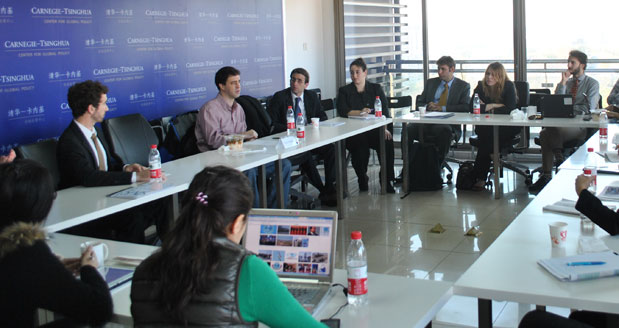{
"authors": [
"Matt Ferchen"
],
"type": "event",
"centerAffiliationAll": "",
"centers": [
"Carnegie Endowment for International Peace",
"Carnegie China"
],
"collections": [
"China’s Foreign Relations",
"China and the Developing World"
],
"englishNewsletterAll": "",
"nonEnglishNewsletterAll": "",
"primaryCenter": "Carnegie Endowment for International Peace",
"programAffiliation": "",
"programs": [],
"projects": [],
"regions": [
"North America",
"South America",
"East Asia",
"China"
],
"topics": [
"Economy"
]
}
Evaluating the China-Latin America Relationship
Mon, November 19th, 2012
Beijing
IMGXYZ4165IMGZYXChina has become one of Latin America’s most important trade partners. In addition to accounting for 10 percent of Latin American exports, China is also the third-largest foreign investor in the region after the United States and the Netherlands, with total foreign direct investments of $22.7 billion in 2011. Although China has created a boom for commodity exporters, Sino-Latin American relations remain fraught with unease and anxiety. A purely economic focus belies deeper political and cultural frictions between the two regions, leading to doubts about the long-term sustainability of China’s presence.
Carnegie-Tsinghua’s Matt Ferchen hosted a delegation of graduate students from the John Hopkins School of Advanced International Studies to discuss recent development in Sino-Latin American relations, and the potential impact of that relationship on the United States.
A Happiness Imbalance
- China’s Satisfaction: Ferchen pointed out that China looks at its investments in Latin American from the “perch” of official diplomacy. In China’s usual diplomatic lexicon of “win-win,” “mutual benefit,” and “complementary” deals, it is more or less happy with the current state of relations. But the Chinese concept of complementarity, he added, is different from Latin America’s, and the burden of understanding these differences falls on the Latin American economies, since these deals matter more to them than to China.
- Latin America’s Unease: On the other hand, Ferchen added, Latin American countries are facing growing unease over their relations with China. He offered the example of Australia, another country with deep ties to China, with which trade caused a commodity boom. But Ferchen explained that Australia was forced to ask “big questions” when demand and prices began to go in the other direction—a state of affairs that could befall some Latin American countries.
- The Middle Income Trap: An emerging concern for China, Ferchen stated, is how to avoid the middle income trap —a term countries like Argentina have come to symbolize. There is a fear in China, he said, that it will become “Latin Americanized,” and these “blanket generalizations” are hurting cultural and political ties between the two regions. There are interesting questions to be asked, he added, like how to change a country’s image in China, something Colombia has done partially by associating itself with an aspirational commodity like “Colombian Coffee.”
Each Country’s Relations to China More Complex
- Brazil: Though Brazil-China relations are often used to exemplify a “happy, cooperative” China-Latin America relationship, Ferchen explained that this sense of satisfaction is actually imbalanced. The future trajectory of Brazil-China relations will only become better for China and worse for Brazil, he stated. This is due to mounting competition between the two economies and talk about moving “beyond complementary” relationships. These signals point to a “simmering unhappiness,” Ferchen contended.
- Venezuela: In the quest for energy security, Ferchen said, China has chosen to build up a huge foreign loan portfolio—$40 billion in the last five to six years, with another $40 billion in other forms of investment. As an example, Venezuela is currently seen by many as a Chinese ally, but Ferchen explained that it is likely that Hugo Chavez has not been forthcoming about his cancer since a post-Chavez Venezuela poses a huge risk for China’s investments in Venezuela.
- Future Destinations: Ferchen explained that since China is considered a latecomer to the region, it has to be more tolerant of political risk in order to have access to valuable natural resources and commodities. He added that the Chinese style of investment preferred sovereign deals with leaders rather than looking at investment climates and rule of law. China is not in the habit, Ferchen stated, of dealing with communities and stakeholders or building a diversified base of political and social support.
Carnegie does not take institutional positions on public policy issues; the views represented herein are those of the author(s) and do not necessarily reflect the views of Carnegie, its staff, or its trustees.
